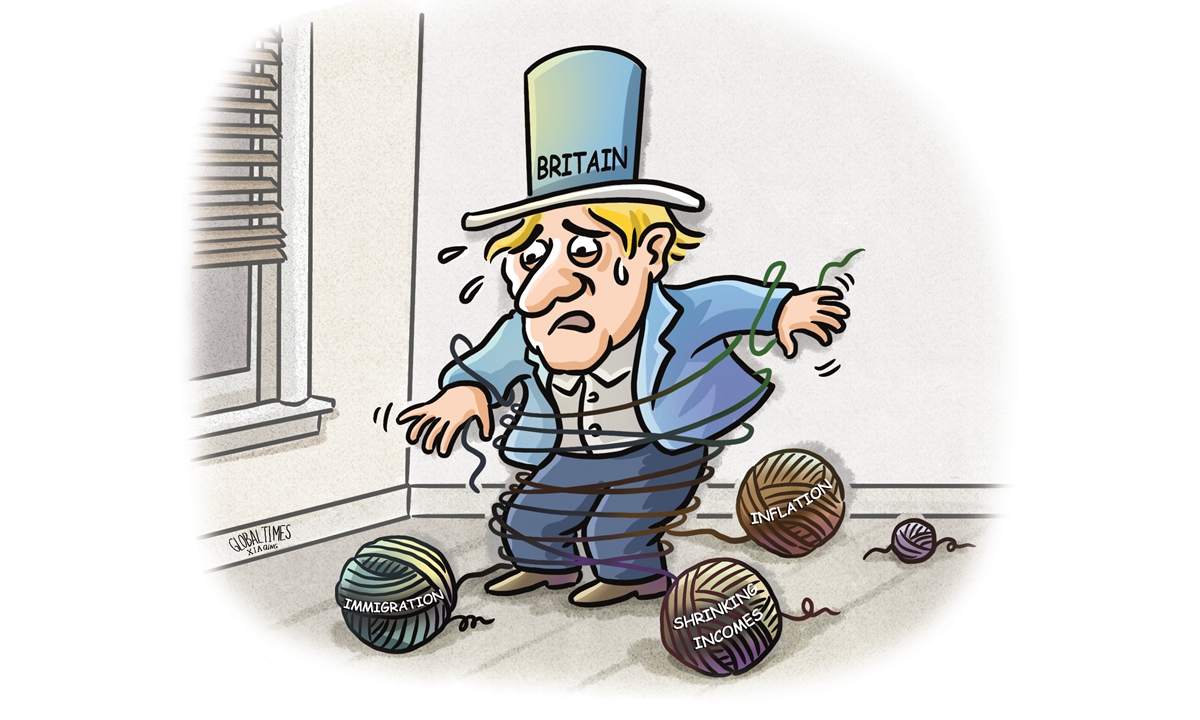
Illustration: Xia/Global Times
It has been a year since the unelected Rishi Sunak took over from the unelected Liz Truss, the shortest-serving prime minister in Britain's history. Truss' term is considered a disaster and now with Sunak's anniversary having passed, his tenure will be under even more scrutiny.
The liberal media, obsessed with identity politics, celebrated Sunak's ascent as a significant step forward for racial equality in the UK. Some believed it signaled that great achievements were on the horizon. However, damning opinion polls and recent by-election defeats reflect that Sunak's achievements are lacking. Sunak hasn't delivered on his five major objectives which are halving inflation, stimulating economic growth, reducing debt relative to GDP, shortening the National Health Service (NHS) waiting list and halting illegal immigration into Britain. This has led the BBC to ask whether it's "back to the 1990s for Sir Keir Starmer's Labour opposition party."
Current data reveals inflation remains above six percent; for Sunak's goal to be met, it would need to drop to 5.3 percent. With reduced spending in September, there are now growing concerns of a potential recession in the retail sector. Figures from the Office for National Statistics indicate that debt as a percentage of GDP has climbed from over 95 percent to 97.8 percent since Sunak assumed office. In August, the NHS waiting list in England stood at 7.75 million - up more than 100,000 from the previous month. Illegal migrants crossing the channel from France reached 44,460 by June 2023, while the number in the whole year of 2022 is 45,755.
Sunak is unelected, so could a momentary lapse in democracy be the culprit to Britain's woes? Perhaps with a national election on the horizon, some may argue that this will be rectified. Yet, the question remains: Who is poised to succeed Sunak? Is someone bearing the title "Sir" truly representative of the working class, who form the democratic majority?
The Labour Party is not a democratic party representing the majority anymore - it lost its vestiges as a worker's party decades ago. Since the end of WWII when the Labour Party ushered in democratic concessions, like the NHS, the party began to be steadily co-opted by transnational capital. This culminated in New Labour, an imperialist party posing as a progressive force, which sent Britain's working-class soldiers into needless wars. Consequently, it should fill people with doom and gloom when the BBC proclaims it's "back to the 1990s for Sir Keir Starmer's Labour opposition party."
The truth is, like many liberal democracies today, Sunak is a frontman, at best a manager of the status quo - this applies to whoever will succeed him as well. Simply put, British citizens can vote, but they can't vote for democracy. Consequently, blaming one person for Britain's downfall and assuming the next leader can do significantly better is a charade.
History has shown that Britain has always sought to replace unity with ethnic divisions. With disunity, democratic progress becomes impossible. As such, for the UK to improve, working-class unity is essential and this requires ethnic unity too.
To achieve this, the primary focus of blame must be taken away from the embodied form of individual leaders, migrants and certain sections of the working class. Instead, the left, in a non-utopian fashion, must build ethnic solidarity by recognizing the genuine frustrations of the working class. They must patiently engage with them by redirecting their animosity away from blaming others toward transnational class contradictions and the lack of real democracy in the UK.
The author is an independent international relations analyst who focuses on China's socialist development and global inequality. opinion@globaltimes.com.cn
